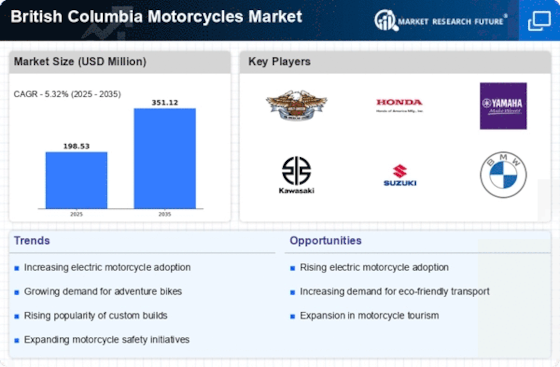Top Industry Leaders in the British Colombia Motorcycles Market
*Disclaimer: List of key companies in no particular order
The British Columbia motorcycle market's competitive landscape
The British Columbia (BC) motorcycle market presents a dynamic and diverse landscape, driven by stunning scenery, passionate riders, and a growing urban population. This report explores the key players, their strategies, and the evolving trends shaping the market.
Key Players:
- Established Dealerships: Long-standing dealerships like Bob's BMW, Dainese Vancouver, and Victoria Harley-Davidson hold significant brand recognition and customer loyalty.
- Direct-to-Consumer Brands: Online players like Harley-Davidson's online platform and Zero Motorcycles' direct sales model are gaining traction, challenging traditional dealership models.
- Independent Shops: Smaller, independent shops cater to niche markets, offering specialized services and customized experiences.
- Emerging Players: New entrants like electric motorcycle startups and rental platforms are disrupting the market with innovative offerings.
Market Share Analysis Factors:
- Brand Portfolio: Diversity and popularity of motorcycle brands offered, catering to various riding styles and budgets.
- Customer Service: Quality of sales, service, and repair experiences, building trust and loyalty.
- Community Engagement: Active participation in local events, rides, and clubs, fostering brand affinity.
- Digital Presence: Effective online marketing, website functionality, and social media engagement.
- Financing Options: Availability and competitiveness of financing options to attract new riders.
New and Emerging Trends:
- Electric Motorcycles: Growing popularity of electric motorcycles driven by environmental concerns, government incentives, and expanding range options.
- Adventure Touring: Increasing demand for adventure touring motorcycles and accessories, fueled by BC's diverse riding terrain.
- Urban Mobility: Rise of smaller, commuter-friendly motorcycles as urban populations seek convenient transportation alternatives.
- Personalization: Customization options and aftermarket parts gaining popularity, allowing riders to express individuality.
- Subscription Services: Motorcycle subscription platforms offering flexible access and convenience, attracting new riders.
Overall Competitive Scenario:
The BC motorcycle market is moderately competitive, with established players facing challenges from new entrants and evolving trends. Success hinges on adapting to changing customer preferences, embracing digitalization, and offering diverse and innovative motorcycle solutions.
- Established dealerships: Need to enhance digital presence, offer competitive financing, and cater to niche markets.
- Direct-to-consumer brands: Must build local brand awareness and establish service networks.
- Independent shops: Require strong specialization, community engagement, and competitive pricing.
- Emerging players: Need to build trust, establish brand identity, and secure strategic partnerships.
The future of the BC motorcycle market is likely to see continued growth, driven by electric motorcycles, urban mobility solutions, and personalized offerings. Players who adapt to these trends and build strong customer relationships will be well-positioned for success.
Latest Company Updates:
Harley-Davidson:
- July 2023: Launched the X440 bike, developed in partnership with Hero MotoCorp, targeting the entry-level segment.
- Focus: Increasing presence in Asia, expanding electric motorcycle offerings (LiveWire brand).
PIERER Mobility AG (KTM, Husqvarna, GasGas):
- September 2023: Announced plans to invest €100 million in its Mattighofen, Austria, motorcycle production facility.
- Focus: On off-road and adventure motorcycles, performance segment.
Suzuki Motor Corporation:
- May 2023: Recalled select V-Strom and GSX-S1000 models due to potential engine issues.
- Focus: On middleweight and heavyweight motorcycles, expanding adventure touring segment.










